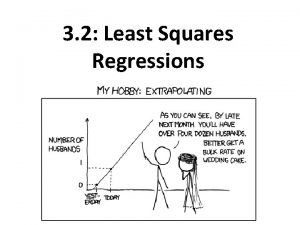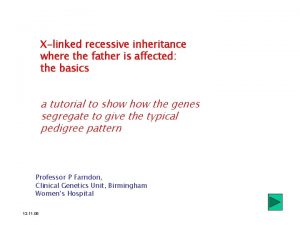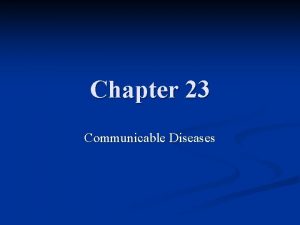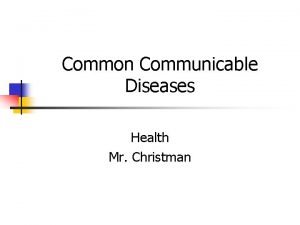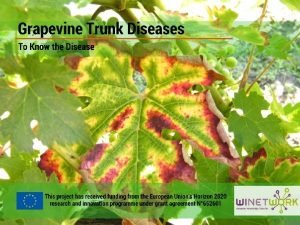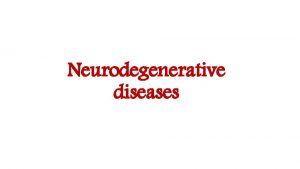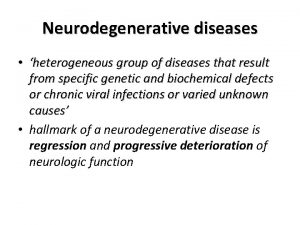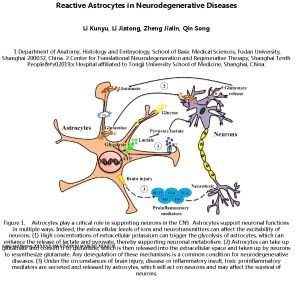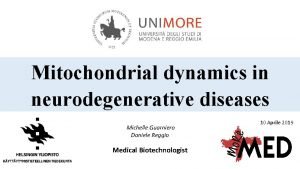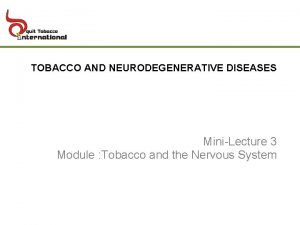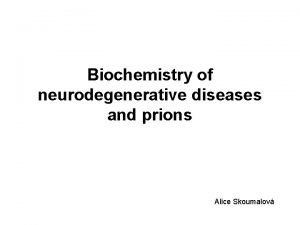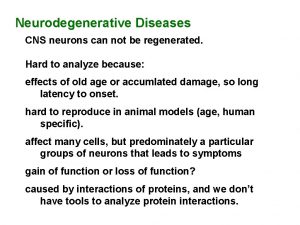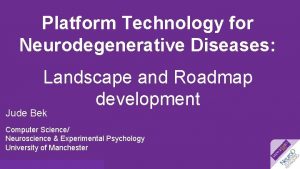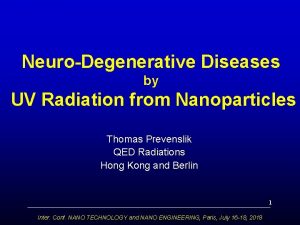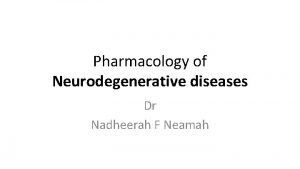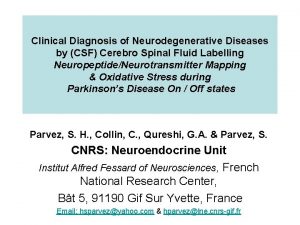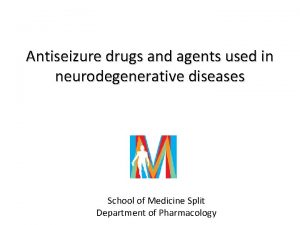TREATMENT OF NEURODEGENERATIVE DISEASES Neurodegenerative diseases affect millions



















- Slides: 19

TREATMENT OF NEURODEGENERATIVE DISEASES

Neurodegenerative diseases affect millions of people worldwide. Alzheimer’s disease and Parkinson’s disease are the most common neurodegenerative diseases. Neurodegenerative diseases occur when nerve cells in the brain or peripheral nervous system lose function over time and ultimately die. Although treatments may help relieve some of the physical or mental symptoms associated with neurodegenerative diseases, there is currently no way to slow disease progression and no known cures.

Neurodegenerative diseases Many of these diseases are genetic. Sometimes the cause is a medical condition such as alcoholism, a tumor, or a stroke. Other causes may include toxins, chemicals, and viruses. Sometimes the cause of degenerative nerve diseases is unknown. Degenerative nerve diseases can be serious or lifethreatening. It depends on the type. Most of them have no cure. Treatments may help improve symptoms, relieve pain, and increase mobility.

Neurodegenerative diseases Alzheimer's disease Parkinson's disease Amyotrophic lateral sclerosis Friedreich's ataxia Huntington's disease Lewy body disease Spinal muscular atrophy

Neurodegenerative diseases Alzheimer’s disease

Alzheimer’s disease (AD) is an irreparable, progressive neurodegenerative disease that affects normal brain functioning. It is mainly the general cause of dementia. Dementia is a syndrome associated with memory loss and loss of abilities like thinking, reasoning, and language skills along with other mental illness.

Alzheimer’s disease The cause of AD is not clearly understood. Genetic: Nearly, 70% of the cases are related to genetic factors with the involvement of many specific genes Cholinergic hypothesis: The cholinergic hypothesis states that AD is caused by the reduced synthesis of neurotransmitter acetylcholine [20]. Amyloid hypothesis: The amyloid hypothesis states that AD is caused by the deposits of extracellular amyloid beta (Aβ) Tau hypothesis: The tau hypothesis states that AD is caused due to abnormalities in tau protein, leading to the disintegration of microtubules in nerve cells

Treatment of Cognitive Symptoms of AD At present, no disease-modifying therapy for AD is available; current treatment is aimed at alleviating symptoms: Treatment of Cognitive Symptoms: Augmentation of the cholinergic transmission: donepezil, rivastigmine, and galantamine (antagonists of cholinesterases) Memantine (a noncompetitive antagonist of the NMDA type glutamate receptor). It is used as either an adjunct or an alternative to cholinesterase inhibitors in AD

Treatment of Behavioral Symptoms of AD In addition to cognitive decline, behavioral and psychiatric symptoms in dementia (BPSD) are common, particularly in middle stages of the disease. These symptoms include irritability and agitation, paranoia and delusional thinking, wandering, anxiety, and depression. Treatment can be difficult, and nonpharmacological approaches should generally be first line. Citalopram (SSRI) risperidone, olanzapine, and quetiapine (Atypical antipsychotics) Benzodiazepines Haloperidol (typical antipsychotic)

Neurodegenerative diseases Parkinson Disease

Parkinsonism is a clinical syndrome with four cardinal features: • Bradykinesia (slowness and poverty of movement) • Muscular rigidity • Resting tremor (which usually abates during voluntary movement) • Impairment of postural balance, leading to disturbances of gait and to falling

Treatment of Parkinson Disease Levodopa (metabolic precursor of DA) Dopamine Receptor Agonists: Ropinirole pramipexole, and Rotigotine Apomorphine (sc inj) Selegiline and rasagiline (Selective MAO-B inhibitors) trihexyphenidyl and benztropine mesylate (Antimuscarinic drugs), diphenhydramine hydrochloride (antihistaminic and central muscarinic receptors antagonist) Amantadine, (an antiviral agent used for the prophylaxis and treatment of influenza A; alter DA release in the striatum, has anticholinergic properties, and blocks NMDA glutamate receptors) tolcapone and entacapone (COMT inhibitors)

Neurodegenerative diseases Parkinson Disease

Neurodegenerative diseases Parkinson Disease

Neurodegenerative diseases Huntington Disease

Huntington disease is a dominantly inherited disorder characterized by the gradual onset of motor incoordination and cognitive decline in midlife Treatment: Symptomatic Treatment None of the currently available medications slows the progression of the disease Tetrabenazine: treatment of chorea associated with HD Deutetrabenazine Fluoxetine: Symptomatic treatment (antidepressant)

Neurodegenerative diseases Amyotrophic Lateral Sclerosis

Amyotrophic Lateral Sclerosis Amyotrophic lateral sclerosis (ALS or Lou Gehrig disease) is a disorder of the motor neurons of the ventral horn of the spinal cord (lower motor neurons) and the cortical neurons that provide their afferent input (upper motor neurons) The disorder is characterized by rapidly progressive weakness, muscle atrophy and fasciculations, spasticity, dysarthria, dysphagia, and respiratory compromise.

Treatments Riluzole: inhibits glutamate release, blocks postsynaptic NMDA- and kainate-type glutamate receptors and inhibits voltage-dependent Na+ channels. Edaravone: Free radical scavenging properties that may reduce oxidative stres. Exact mechanism of action is unknown Symptomatic Therapy of ALS: Baclofen (for spasticity), Tizanidine (of α 2 adrenergic receptors agonist in the CNS, reduces muscle spasticity
 There are millions of stars in the sky
There are millions of stars in the sky Europe population in millions
Europe population in millions Qui veut gagner des millions musique
Qui veut gagner des millions musique Paid drawing. it be work millions.
Paid drawing. it be work millions. What is the jackpot on mega millions
What is the jackpot on mega millions Millions billions trillions chart
Millions billions trillions chart Drawing. could be work millions.
Drawing. could be work millions. Speciation can only be observed over millions of years
Speciation can only be observed over millions of years Herbivores dinosaur
Herbivores dinosaur The scatterplot shows the payroll (in millions of dollars)
The scatterplot shows the payroll (in millions of dollars) Financial statement in millions
Financial statement in millions Qui veut gagner des millions
Qui veut gagner des millions Where is kidney pain felt diagram
Where is kidney pain felt diagram X linked diseases
X linked diseases Chapter 23 lesson 1 understanding communicable diseases
Chapter 23 lesson 1 understanding communicable diseases Conclusion of plant diseases
Conclusion of plant diseases Chapter 24 lesson 1 sexually transmitted diseases
Chapter 24 lesson 1 sexually transmitted diseases Female reproductive system diseases
Female reproductive system diseases Non common communicable diseases
Non common communicable diseases Similar pictures
Similar pictures









